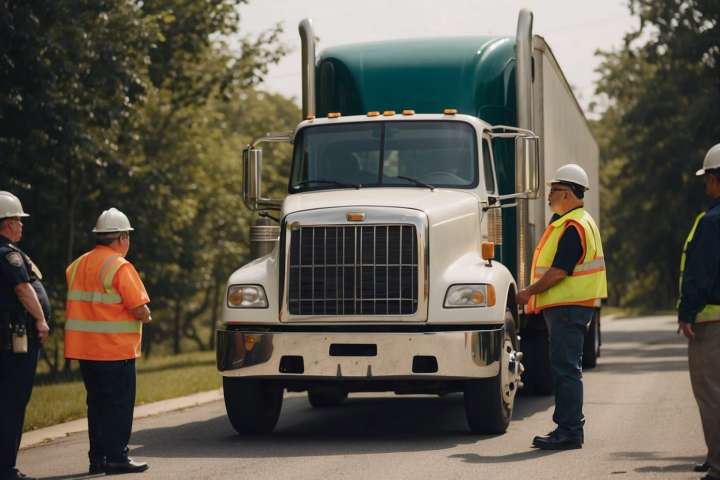When a moving truck accident occurs, identifying the liable party can be complex. Liability may fall on the truck driver, the moving company, or even the truck manufacturer, depending on the circumstances of the accident and the cause. Understanding these distinctions is crucial for anyone involved in or affected by such an incident.
Truck drivers can be held responsible if their negligent or reckless driving caused the accident. Similarly, if the moving company failed to maintain the truck properly or did not adequately train its drivers, they could be deemed liable. In some cases, mechanical failures or defective parts may place the responsibility on the truck manufacturer.
The legal landscape for moving truck accidents involves various factors, making each case unique. Victims of these accidents need to know their rights and who to hold accountable to seek appropriate compensation.

Determining Liability in Moving Truck Accidents
Liability in moving truck accidents depends on various factors, including the involvement of the moving company, the actions of the driver, maintenance issues, and third-party roles. Understanding each aspect is crucial for identifying the responsible parties.
Moving Company Responsibility
Moving companies may be liable if they employ negligent hiring practices, fail to provide adequate training, or do not follow regulations. Companies must ensure drivers have proper licenses and maintain compliance with safety standards. Important factors include:
- Hiring practices
- Training programs
- Compliance with regulations
Failing to meet these standards can place liability squarely on the moving company’s shoulders.
Driver Negligence
Drivers play a critical role in preventing accidents. Liability for driver negligence can arise from several actions:
- Distracted driving
- Speeding
- Ignoring traffic laws
- Fatigue
Each of these actions represents a failure to exercise due caution. If a driver’s actions directly cause a truck crash, they can be held responsible for ensuing damages.
Truck Maintenance and Defects
Regular maintenance of moving trucks is essential. Liability can fall on the moving company or maintenance providers for issues such as:
- Brake failures
- Engine problems
- Defective tires
Inadequate maintenance or defective parts can lead to accidents. Key maintenance aspects include:
- Routine inspections
- Recording and resolving defect reports
- Ensuring the use of quality parts
Third-Party Liability
Third parties, such as other drivers, pedestrians, or manufacturers, can also be liable. For example, if a car cuts off a moving truck, causing the truck to crash, that car’s driver may share responsibility. Common third-party liabilities include:
- Other road users causing accidents
- Manufacturer defects in the truck parts
- Entities responsible for road conditions
Liability is assessed based on the actions of all involved parties.
Legal Ramifications and Actions
Understanding liability in a moving truck accident involves several key areas including personal injury claims, the insurance claims process, and adherence to state and federal trucking regulations. Each aspect has significant implications for both the involved parties and the governing authorities.
Personal Injury Claims
Personal injury claims arise when victims of a moving truck accident seek compensation for injuries. These claims require evidence of negligence or fault. Injury types range from minor bruises to severe ailments like spinal damage. Medical documentation, witness statements, and police reports are critical in establishing the claim.
Often, the truck driver, moving company, and even the manufacturer can be held liable. Claimants should consult experienced legal professionals to navigate the complexities of filing and pursuing these claims. Awards may cover medical expenses, lost wages, and pain and suffering.
Insurance Claims Process
The insurance claims process involves multiple parties, including the insurance providers for both the truck driver and the moving company. After an accident, prompt notification to the insurance companies is essential. Detailed information about the crash, such as date, time, and weather conditions, supports the claim.
Truck companies usually carry commercial vehicle insurance, which often covers more significant damages than standard policies. Delay in filing claims can result in denial or reduced payouts. Keeping thorough records of all communications and submissions is crucial for a successful claim.
State and Federal Trucking Regulations
State and federal trucking regulations play a significant role in determining liability in moving truck accidents. The Federal Motor Carrier Safety Administration (FMCSA) sets rules for truck drivers, such as hours-of-service limits and maintenance protocols. Non-compliance with these regulations can imply fault.
State laws may vary, affecting how cases are handled and what evidence is permissible in court. Understanding both sets of regulations helps in constructing a robust legal strategy. Regular audits and compliance checks by trucking companies can mitigate risks and prevent regulatory breaches.
We hope you found this blog post on Who Is Liable In A Moving Truck Accident? useful. Be sure to check out our post on How Transportation Has Upgraded Over the Years for more great information!
Have Experience in the Moving Industry? Want an Additional Income Stream? Work With All Around Moving!
Join this unique opportunity! If you want to apply your expertise in the moving industry, team up with us and we’ll help you make money. Click here to learn more.





